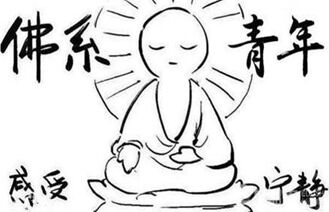网络流行词'佛系青年'引发探讨
While their country's leader has encouraged citizens to work harder and dream big, some Chinese millennials are declaring their allegiance to the art of being average.
中国一些千禧一代宣布他们甘于平庸,尽管他们的国家领导人鼓励国民们努力工作、怀有远大梦想。
Nicknamed "Buddhist Youth", these young people have embraced a laissez-faire approach to life.
这些年轻人被称为“佛系青年”,他们对生活持有放任的态度。

"Life is quite tiring," said 23-year-old Guo Jia, who believes being a Buddhist Youth means "accepting the things you cannot change and going with the flow".
“生活十分累人,”23岁的郭佳说。她认为,“佛系青年”意即“接受你无法改变的事情,随波逐流”。
As a viral Chinese social media post outlined, behaviours associated with the largely irreligious Buddhist Youth include eating the same food every day, allowing one's romantic partner to make all the decisions and being devoid of strong feelings about virtually everything.
与宗教无多大关系的“佛系青年”是中国社交媒体上的流行词,它的相关行为包括每天吃同样的东西,允许爱人做所有决定,对任何事情几乎都没强烈的感觉。
A Buddhist Youth wants nothing because she or he expects nothing - win or lose, adversity or good fortune, they accept it all.
佛系青年什么都不想要,因为他(她)没有期望--无论输、赢,不幸、好运,他们统统接受。
The trend has even caught the attention of the People's Daily, the official paper of the ruling Communist Party, which published two articles on Buddhist Youth.
这一趋势甚至受到了执政的共产党的官方报纸《人民日报》的关注,该报近日就“佛系青年”发表了两篇文章。
"This may just be a way for young people to explore their position in society," the daily said, acknowledging that the identity was a reaction to "life's quick rhythms".
《人民日报》写道:“这可能仅是年轻人探索他们的社会地位的一种方式。”该报承认,这种身份(指“佛系青年”)是对“生活的快节奏”的一个反映。